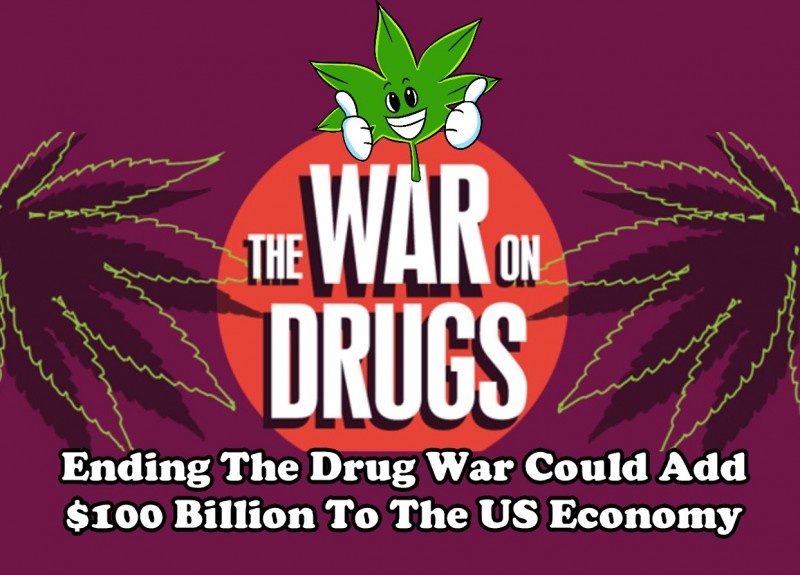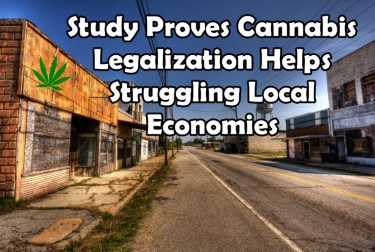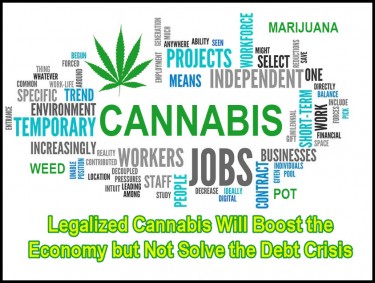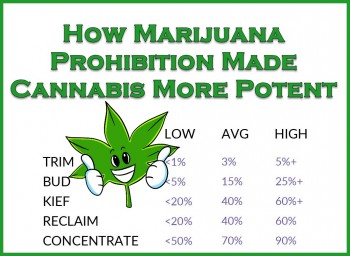Ending The Drug War Could Add $100 Billion To The US Economy
Ending the War on Drugs Could Save the US Economy $100 Billion a Year? from CannabisNet on Vimeo.
The archaic drug war in the United States could seriously benefit millions of people with chronic illnesses if it ends, and the added $100 billion injected to the US economy wouldn’t hurt either.
A new report from the Cato Institute, a libertarian think tank, revealed that if federal prohibition of all drugs comes to an end has projected that $100 billion in law enforcement savings and annual tax revenues could boost the country’s annual budget. According to Jeffrey Miron, Cato Institute director of economic studies and a director of undergraduate studies at the Economics Department of Harvard: “At both the federal and state levels, government budgets would benefit enormously from drug legalization policies.”
“This report estimates that $47.9 billion is spent annually on drug prohibition enforcement, whereas $58.8 billion could potentially be raised in tax revenue,” Miron writes in the report. In 2010, Miron released a similar report discussing the monetary benefits that legalizing cannabis and other drugs could bring in. However, the new projections have surpassed anything that we previously thought possible, thanks to numerous other states legalizing cannabis since then.
“Washington collected nearly $70 million in marijuana tax revenues during the first year of legalization, almost exactly the estimate in the 2010 report once adjusted for inflation. In fiscal year 2016, however, Washington collected nearly triple that amount, and in fiscal year 2017 tax revenues reached nearly $320 million. Oregon collected only $20.6 million in fiscal year 2016, about half the 2010 estimate, but it collected $70.3 million in fiscal year 2017, well above the 2010 estimate. In Colorado, marijuana tax revenues have risen from $67.6 million in calendar year 2014 to $247.4 million in calendar year 2017. Even adjusting for inflation, those figures far outstrip the 2010 estimates as well as the updated estimates presented in this paper,” writes the report.
Additionally, Miron states that the new analysis’ higher numbers could also be a result of healthy revenues thanks to cannabis tourism; but another reason could also be the fact that cannabis prices haven’t dropped as much as originally expected during legalization.
“Revenues may continue to increase over time as more stores open or if demand increases as a result of greater cultural acceptance of marijuana,” Miron writes. “But revenues in existing legalization states may also moderate if other states or the federal government legalizes marijuana. Another consideration is that a nontrivial share of tax revenue in Colorado, Oregon, and Washington has been generated from collection of one-time application and licensing fees… As recreational marijuana becomes a more established industry, states will likely see a decline in the number of new entrants and therefore a decline in licensing revenue.”
Societal Impact Of Drug Legalization
“Drug legalization affects various social outcomes,” Miron writes. “In the debate over marijuana legalization, academics and the media tend to focus on how legalization affects public health and criminal justice outcomes. But policymakers and scholars should also consider the fiscal effects of drug liberalization. Legalization can reduce government spending, which saves resources for other uses, and it generates tax revenue that transfers income from drug producers and consumers to public coffers.”
Miron also says that the legalization not just of cannabis but also hard drugs such as heroin, cocaine, and MDMA could add $58 billion in tax revenues on top of the $47 billion in law enforcement and spending. “Although media outlets and policymakers mostly focus on marijuana, the minority of budgetary gains would likely come from legalizing heroin and cocaine,” he writes.
These figures don’t even include the potential savings if the opioid crisis was stopped. A recent report released earlier this year revealed that the opioid epidemic is currently costing the US economy a staggering $1 trillion – and growing.
The report, released by a Altarum, a consulting institute, said that the opioid crisis will be costing an additional $500 billion to the US budget until 2020 unless an effective solution has been found. The biggest cost, identified in the report, was the “lost earnings and productivity from overdose deaths – estimated at $800,000 per person based on an average age of 41 among overdose victims.”
Other factors that contributed to lost revenue include the spending on health care, expenses on criminal justice and education, and social services. From 2001 to 2017 alone, healthcare costs related to the opioid crisis peaked $217.5 billion.
Ending The Drug War Could Add $100 Billion To The US Economy from CannabisNet on Vimeo.
OTHER STORIES YOU MAY ENJOY...
LEGALIZE CANNABIS AND THE ECONOMY WILL BOOM, CLICK HERE.
OR..
CANNABIS HELPING LOCAL ECONOMIES, CLICK HERE.









